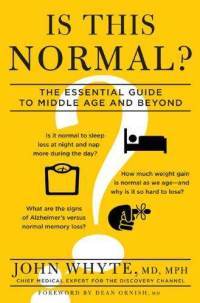October 14, 2011 — You used to sleep soundly for hours, but now you wake up once or twice a night. You’re losing a small patch of hair on your scalp. You can’t hear too well out of one ear. You have trouble remembering people’s names.
But you’re middle-aged, so it’s probably normal—right?
Harvard School of Public Health alumnus John Whyte offers advice on these and many other issues facing folks in their 40s, 50s, and 60s in his new book, Is This Normal? The Essential Guide to Middle Age and Beyond.
Whyte, MPH ’93 and a member of the School’s Leadership Council, has been the Discovery Channel’s chief medical expert and vice president for continuing medical education since 2005. He said he decided to write the book because, working as an internist, many of his patients voiced concerns about things like spots on their arms or losing their sense of taste and smell—and wondered if it was normal or not.
While there are plenty of books on the market with advice for kids or teens or for people near the end of life, Whyte said, there was no real guidebook for people who are middle-aged.
“I found over the years that people wanted a guidebook to help answer questions such as what happens to our skin, joints, metabolism, eyes and memory,” he said. “They want to know about relationships and sex—not to mention bowels and bladders.”
He added, “We need to know what’s normal and isn’t as we get older. It can be hard to differentiate normal aging from disease. After all, it is primarily disease that makes getting older miserable—not the normal changes of aging.”
Whyte hopes the book will help people who are embarrassed to bring up concerns with their doctors or with family and friends.
Feedback on the book has been positive, Whyte said. “Many people have told me that their doctor had never explained what to expect as they got older, so they were confused,” he said. “Others talked about how they had attributed some conditions to ‘simply old age,’ but it turned out to be more serious. Hopefully, this book will alert readers to changes that are definitely not normal, helping them know when to seek medical care.”
–Karen Feldscher
